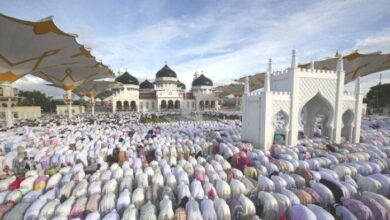Reform in the Land of Kings

[Historical Short Story by Fatchuri Rosidin]
That afternoon a merchant ship from Java docked at the port of Ternate, the capital of the Gapi kingdom. Like other merchant ships, they would usually dock a few weeks and carry out trade transactions. Ternate is the easternmost port city in the cluster of islands producing the world's best spices. It is not surprising that many merchant ships from Java, Goa, Banjar, Malacca, India, and Arabia anchored in Ternate.
Among the merchant ships, there was a young scholar named Maulana Husein. He came to preach in the kingdom of Gapi. As a Muslim, it is great happiness if it can be a way of delivering guidance for others. Maulana Husein decided to stay in the city of Ternate. As an international port city, its society is more open to foreigners who come like itself.
The kingdom of Gapi was founded in 1257; the result of the merger of 4 clans, each of which is led by a momole. After joining, they chose a momole to become kolano or king. Ternate is designated as the capital city. This 4 clan alliance strengthened Gapi. Its territory continues to grow not only in northern Maluku, but also extends east to northern, eastern and central Sulawesi. In the north, the Gapi region extends to the southern part of the Philippine archipelago. Gapi even conquered the Marshall Islands in the Pacific Ocean, northeast of Papua New Guinea. Although the name is not as well-known as Majapahit, the Gapi kingdom is the largest kingdom in the eastern archipelago.
Maulana Husein came to Ternate to continue the preaching that had been started by previous scholars since the 13th century. As a reciter, his melodious recitation of the Qur'an quickly caught the attention of the Ternate people. The beauty of his voice became the byword of the city until it reached the palace.
One day, a royal envoy came to Maulana Husein's pesantren.
"Tuan Guru, I was asked by His Excellency Kolano Baguna to invite Tuan Guru to the palace," said the messenger.
"Is there a movement that Your Majesty calls me?" asked Maulana Husein in surprise.
"Tuan Guru's voice when reading the holy book has become the lips of the people," replied the envoy, "His Excellency Kolano Baguna would like to hear the reading of Tuan Guru in the palace with officials and royal elders."
Maulana Husein gave thanks in his heart. This is God's answer to his prayers so that his preaching can be accepted by the Gapi community.
That morning in 1465, Maulana Husein recited the Koran in front of Kolano Baguna II, the momoles, jogugu (prime minister), bobato (council 18), and other royal dignitaries. Not only reciting the Koran, Maulana Husein also explained the contents that made many Gapi aristocrats embraced Islam. Kolano Baguna II even asked Maulana Husein to teach Islam to royal officials.
In 1486 Kolano Baguna II died and was succeeded by his son, Zainal Abidin. At that time, Islam had become an important religion in the Gapi court. Kolano Zainal Abidin himself was a student of Maulana Husein.
"Tuan Guru," said Kolano Zainal Abidin one day to his teacher, "The greatness and fame of the Islamic caliphate to become the largest empire in the world continues to disturb my dreams. I want to deepen the knowledge of Islamic governance so that Gapi becomes the center of Islamic civilization in the eastern world. Where should I study? "
Maulana Husein, who understood the anxiety of his student, replied, "In Java there is a scholar who is very good at governance. His name is Maulana 'Ainul Yaqin. He is known by the title Sunan Giri who founded the pesantren in Giri Kedaton. Giri Kedaton is the center of education for Majapahit aristocrats and their allied kingdoms. Nobles from Palembang, Malacca, Pasai, Gowa, Buton, Banjar, Martapura, and Kutai also studied there. "
So, one day in 1494, Kolano Zainal Abidin left for Majapahit to study at the Giri Kedaton pesantren. He departed with a gift of cloves which became the main commodity of his country until he was known in Giri Kedaton as Sultan Bualawa which means the sultan of the clove-producing country.
At Giri Kedaton, Zainal Abidin has been diligently studying government science from Sunan Giri as well as deepening Islamic knowledge. He also developed friendships and learned from each other from the various kingdoms who studied there. Having had enough, Zainal Abidin returned to Maluku to apply his knowledge. Not to forget, he invited some Giri Kedaton students to become scholars who teach Islam to the Gapi people.
Arriving in Ternate, Zainal Abidin immediately carried out political reforms. He announced it in front of all royal officials.
"As you know, I went to Java to study government from His Excellency Sunan Giri. And today I am announcing the change of government of the Gapi, ”Kolano Zainal Abidin started his reform announcement that morning.
"I changed the name of the kingdom of Gapi to the Sultanate of Ternate. Kolano's title changed to sultan. The Council of 18 will be divided into two: a black bob for general government affairs and a white bob for religious affairs. Bobato Putih is tasked with compiling laws that breathe Islam, making legal instruments based on Islamic law, managing the implementation of Islamic law in society, and developing Islamic education. The Boboto Putih structure itself consists of a qadhi, 2 priests, 4 preachers, and 8 moders. I will become an Islamic coach with the title Amiruddin who is carrying out Boboto Putih. Islamic schools will be opened in Ternate with teachers that I have brought from Java. "
Sultan Zainal Abidin made Ternate the first Islamic sultanate in the eastern archipelago. Ternate has even become an Islamic kingdom before the establishment of the Sultanate of Demak, which is known as the first Islamic sultanate in Java. Under the leadership of Sultan Zainal Abidin, the reform of the Ternate government became the inspiration for other kingdoms in eastern Indonesia. The government system of the Ternate sultanate was later copied by other kingdoms such as Tidore and Bacan, which all turned into sultanates. That is why Ibn Battuta, who had stopped in Ternate, called this area the jazirotul grandiose or the land of kings. The term jazirotul grandiose then transformed into embarrassment.
Right at the turn of the century, in 1500 AD, Sultan Zainal Abidin died after completing political reform in Ternate. It has left a valuable legacy not only for the Sultanate of Ternate, but also for other kingdoms in the archipelago which are in the process of becoming Islamic sultanates. [Source: www.fatchuri.com] [DDHK News]



